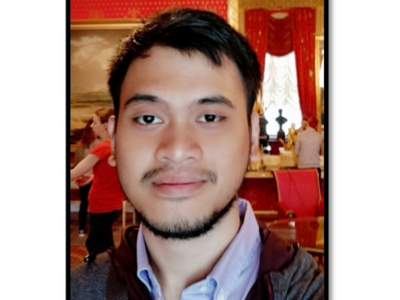

What is your research about?
Imagine for instance an audio signal. As mathematicians, we identify its highest frequency called the bandwidth. For bandlimited signals (i.e., signals of finite bandwidth), the bandwidth gives you information on how the signal must be sampled without loss of information. Even when transmitting partial information (the samples) from a signal and transmit it, the receiver can in principle perfectly recover the signal. In the context of time-frequency analysis where we study simultaneous representations of a signal in both time (how a signal progresses as time goes by) and frequency (at which frequencies does the signal oscillate), it is a well-known fact that in general, signal frequency characteristics typically vary over time. Mathematicians and engineers have been studying the notion of local bandwidth where we assign possibly different bandwidths to certain segments of a signal. This way, we can sample and reconstruct local segments using classical methods. However, this procedure is fundamentally flawed since the concept of local bandwidth contradicts the uncertainty principle.
Despite this obstruction on defining local bandwidth, several definitions have been proposed by engineers and mathematicians. I wrote my dissertation “Spaces of Functions of Variable Bandwidth Parametrized by Piecewise Constant Functions” under the supervision of Dr. Gröchenig and Dr. Klotz at the University of Vienna. We worked on the theoretical details of a particular class of spaces of variable bandwidth and demonstrated that these are sound models for functions having local bandwidths. We also explored some of the numerical aspects of sampling and reconstruction of these functions.
The goal of mathematicians is to get a deeper understanding of concepts that have only practical meaning so far. Engineers have been using different notions of local bandwidth for years, and we hope that this work offers a solid mathematical foundation on the topic. I find it interesting to study a new definition of a mathematical object and it feels exciting to obtain results that are extensions of classical ones. Furthermore, these new results have wider applications and may have new and intriguing consequences as well. We do hope that more people investigate this topic and find more research problems such as formulating optimal numerical algorithms for sampling and reconstruction as well as exploring practical applications of the theory.
My scholarship-funded stay in Austria:
During my stay with the Ernst Mach Grant ASEA UNINET, I was able to attend several conferences and summer schools in Vienna and abroad where I presented part of my work and received feedback from top mathematicians in my field. Attending these events gives you a perspective on the current state of research and in which direction it is headed. In 2020, I had confirmed conference attendances but due to the COVID-19 pandemic, these plans had been cancelled. Now, my adviser and I are working with Dr. Klotz on the preparation of my dissertation results for journal publication.
Studying in Austria opened the opportunity to establish connections with the best researchers in my field. The Numerical Harmonic Analysis Group (NuHAG) is one of the best research groups in harmonic analysis and being part of it is such an honor and a wonderful experience. My research and writing skills have improved, and I can only sing praises to my adviser for pushing me to do my best.
In my free time, it was fun travelling around Europe! I often made the most out of my summer breaks and Christmas vacations by travelling with Filipino colleagues studying in Europe. Together, we enjoy European culture, cuisine, and nature. It’s also a good time to take breaks from your research to unwind and hopefully come back to work with a clear and refreshed mind. The work culture in Europe and in Philippines are quite different. I admire how Europeans take their time off seriously to focus on their personal well-being, and now I am practicing that. I also love how green Vienna is. When I was working on a difficult problem and I couldn’t think of possible solutions, I visited gardens, parks and other green spaces in Vienna to help collect my thoughts. I still miss that experience, so from time to time I visit a few parks in Manila.
Cooperation between my home institution and the University of Vienna:
My home institution will be hosting a SEAMS summer school on modern trends in signal and data processing in December, of which two of the speakers are doctoral graduates (one is from the Philippines and an OeAD alumni scholar) of the University of Vienna. I guess that is quite a close example of cooperation that OeAD promotes. In future events we certainly would like experts from the Faculty of Mathematics at the University of Vienna to share their knowledge and hopefully establish connections and collaborate with faculty members of the Institute of Mathematics at UP Diliman.
I do not have any concrete plans for my future yet, as I just finished my dissertation defense, and everything is still sinking in. I plan to work with colleagues from NuHAG and UP Diliman on new research topics, and in a few years maybe apply for a postdoctoral position abroad.
Short narrative portrait
- Home institution: University of the Philippines Diliman; He regularly teaches elementary calculus courses and elementary differential equations and its applications. Besides, he is devoting his time to research, extension services, and administration.
- Institute/research unit: Institute of Mathematics
- Position: Instructor, soon to be Assistant Professor
- Research interests: approximation theory, harmonic analysis, time-frequency analysis, non-uniform sampling, and reconstruction algorithms, reproducing kernel Hilbert spaces, Sturm-Liouville operators.
Most important milestones:
Attending conferences and schools together with top mathematicians, writing and defending the dissertation with distinction, preparing the dissertation for publication, getting good grades in the course work, being part of NuHAG, travelling around Europe.
